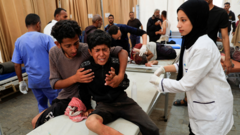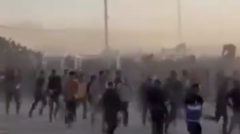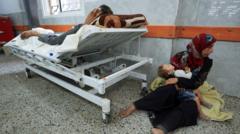President Trump's recent executive freeze on foreign aid has thrown global humanitarian efforts into disarray, drawing criticism from various sectors over potential devastation to food security, healthcare, and overall U.S. influence globally.
Trump’s Foreign Aid Freeze Sparks Global Humanitarian Concerns

Trump’s Foreign Aid Freeze Sparks Global Humanitarian Concerns
The executive order to freeze U.S. foreign aid for 90 days threatens vital programs worldwide, igniting fears of escalating humanitarian crises.
President Donald Trump’s recent order to freeze most U.S. foreign aid for a period of 90 days has led to chaos among humanitarian programs worldwide, sparking fears of significant increases in hunger and health crises. The U.S. Agency for International Development (USAID), which plays a crucial role in providing essential assistance such as food security and medical support, has been profoundly impacted by this decision.
Critics have pointed out that Trump's allegations of corruption within USAID, which he cited to justify the order, were made without providing substantial evidence. The action prompted Tesla CEO Elon Musk to announce intentions to drastically reduce the agency’s budget, claiming USAID resources could be better utilized elsewhere.
The freeze has already resulted in the forced return of thousands of USAID employees from international assignments, with many placed on indefinite leave. New administrative changes have shifted oversight of USAID to the State Department, aggravating concerns about the agency's operational future.
The humanitarian impact of this aid suspension is particularly glaring, with reports indicating that several clinics, maternal care services, and refugee assistance points have either shut down or significantly scaled back operations. For instance, many soup kitchens in conflict-ridden regions, including Khartoum, are ceasing operations, leaving countless individuals dependent on that support without access to vital food supplies.
Infected populations are often seeing an uptick in health crises; aid workers report that due to the disruption of funding, about 40 newborns per day are contracting diseases like HIV. Additionally, important intelligence-gathering programs targeting Al Qaeda are facing interruptions, raising alarms about emboldening terrorist activities.
While a judge has temporarily blocked parts of this aid cessation initiative, the freeze on global support remains firmly in place, leading many to question the Trump administration's strategy and its long-term implications on America’s standing as a reliable partner on the world stage. Concerns abound that indiscriminate aid cuts could lead to widespread humanitarian disasters, thereby deteriorating the U.S.’s ability to influence and stabilize regions in need.
The fallout from the freeze has become a focal point for critics of the Trump administration, spotlighting a growing consensus: that halting foreign aid could reverse decades of progress in humanitarian efforts and global cooperation.





















